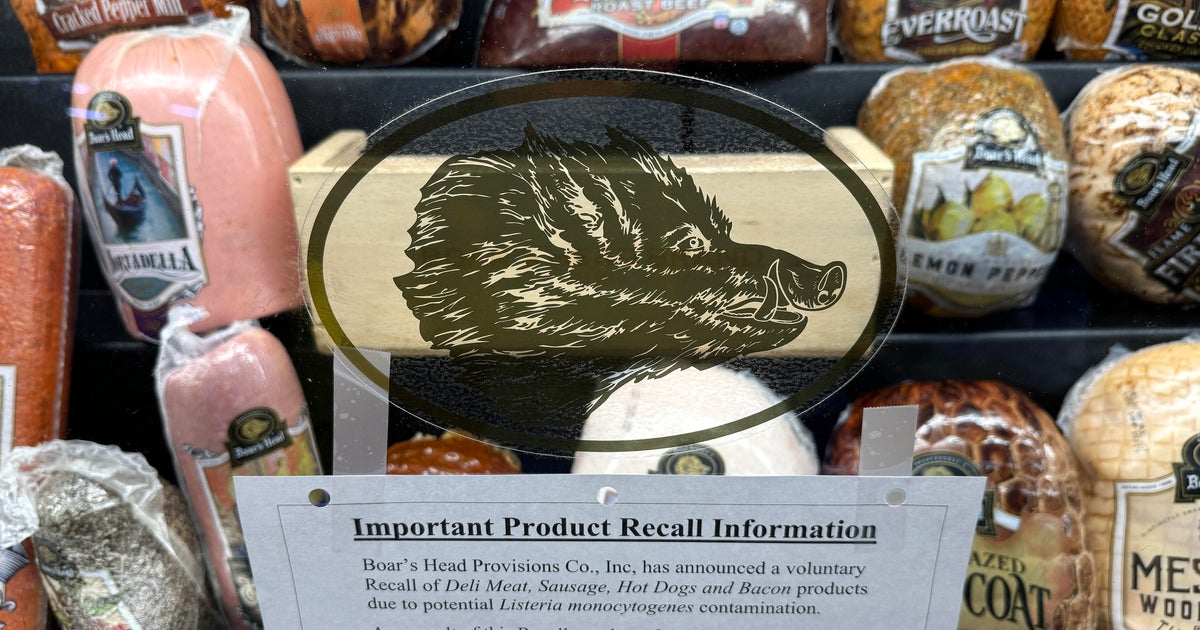Inspectors found dozens of violations at a Boar’s Head factory in Virginia that are now linked to a nationwide recall of sausage products, according to new U.S. Department of Agriculture records. Mold, mildew and insects were among the things repeatedly found throughout the facility.
Last month, Boar’s Head recalled all deli meat from its Jarratt, Virginia, plant after attributing a listeria outbreak to products distributed from the plant.
The outbreak has expanded to 57 hospitalizations in 18 states linked to the recall of products from the plant. At least nine deaths have now been reported, including two in South Carolina and one each in Illinois, New Jersey, Virginia, Florida, Tennessee, New Mexico and New York.
“This is the largest outbreak of listeriosis since the 2011 outbreak linked to cantaloupe melons,” the Centers for Disease Control and Prevention said Wednesday.
Authorities in several states found samples of unopened products distributed from the Boar’s Head plant to be contaminated with the bacteria Listeria monocytogenes. Genetic sequencing linked the bacteria from the products to the strain that caused the outbreak.
The public is urged to check their refrigerators again for the recalled meat and to clean all surfaces that may have come into contact with it.
“Consumers who were unaware of the recall may have eaten the recalled products. Additionally, the illness may have lasted longer,” a South Carolina Department of Health spokesperson said in a statement following the new deaths.
Records released to CBS News by the U.S. Department of Agriculture’s (USDA) Food Safety and Inspection Service in response to a Freedom of Information Act request show 69 cases of “violations” identified by inspectors at the Jarratt plant last year.
Although the agency is ultimately responsible for overseeing the day-to-day operations of the facility, an agency spokesman said Thursday that it relies on Virginia personnel – not USDA employees – to staff the site.
The agency is now working with the state to “ensure that the facility has an effective system in place to produce safe food for the public.”
“FSIS has suspended inspection of the Boar’s Head facility in Jarratt, Virginia. This means it will remain closed until the facility can demonstrate that it can produce safe products,” an FSIS spokesperson said in a statement.
It is unclear whether Boar’s Head will face penalties from the U.S. Department of Agriculture for the repeated violations. Reports released by the agency so far indicate that no “enforcement actions” were taken against the company last year.
The agency spokesman said Boar’s Head had “implemented corrective actions consistent with FSIS regulations.”
A Boar’s Head spokesperson said in a statement that the company deeply regrets the impact of the recall, adding that food safety is the company’s “absolute priority.”
“Because we are a USDA-inspected food producer, the agency has inspectors at our Jarratt, Virginia facility every day, and if at any time the inspectors find something that needs to be corrected, our team will do so immediately, as has been the case with every single issue raised by the USDA in this report,” said company spokeswoman Elizabeth Ward.
All activities at the Jarratt plant have been suspended, Ward said. The company is working to disinfect the plant and retrain employees. No product will leave the plant “until it meets the highest quality and safety standards.”
“During this time, we have been working with the industry’s leading food safety experts to conduct a thorough investigation and get to the bottom of the events that led to this recall,” Ward said.
In addition to problems such as missing paperwork and meat residue on the equipment, records show that Boar’s Head inspectors also repeatedly complained about mold and mildew growth in the company’s facilities in Jarratt.
In July, U.S. government inspectors discovered what appeared to be mold and mildew on the hand basins used by workers handling meat that was supposed to be ready to eat.
According to previous records, mold growth was also observed on the outside of the steel containers used by the plant, as well as in cold storage rooms between the site’s smokehouses.
“There was a black, mold-like substance visible throughout the room at the wall/concrete junction. And also in some spots around brick and metal,” they wrote in January, saying some stains were “the size of a quarter.”
Elsewhere, a number of problems with water leaking or accumulating were identified. For example, “green algae growth” was found in a puddle and condensation was “dripping over stored product.”
After inspectors alerted the company to one of the leaks, workers attempted to repair the leaks.
“The employee wiped a third time and within ten seconds the liquid had leaked out again,” inspectors wrote after a condensation problem emerged on July 27 near fans that had apparently blown the liquid onto uncovered sausage products.
In February, an inspector found “large amounts of blood in puddles on the floor” and a “rancid odor” in a cooler used at the factory.
Numerous records also indicate sightings of insects in and around the factory’s sausage products. One case, for example, prompted the authority to mark over 480 kilograms of ham in the hallway of a smokehouse and “preserve” it for investigation.
In June, another report expressed concern that flies were flying in and out of the “vats of pickles” that Boar’s Head had left in a room.
“We observed small mosquito-like insects crawling along the walls and flying around the room. There was a lot of flesh accumulated on the walls of the room,” they wrote.
Vermin were also discovered in other parts of the facility, including what appeared to be “ants running down the wall,” as well as a beetle and a cockroach.





